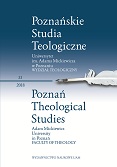„Drzwi zamknięte” czy „otwarte bramy”, czyli tłumacz między profanum a sacrum
“Closed Door” or “Open Gate”: the Translator between the Sacred and the Profane
Author(s): Joanna KubaszczykSubject(s): Christian Theology and Religion, Customs / Folklore, Theology and Religion, Translation Studies
Published by: Uniwersytet Adama Mickiewicza
Keywords: translation; interpretation; religious texts; religion; tradition; inculturation; religious culture; values;
Summary/Abstract: The paper reflects on the specificity of the translation of texts belonging to the religious and theological literature. Religious and theological texts have been translated for millennia, many of them - originating in the sphere of Judeo-Christianity - lie at the core of Western culture. Their translation, especially the translation of the Bible, was accompanied by theoretical reflection (see, for example, Jerome of Stridonium, Martin Luther or Eugene Nida), which permanently influenced the way of thinking about translation in general. The present study answers the question of how the translation of religious and theological texts differs from the translation of other texts and what the translator must or should take into account, translating religious and theological texts. The paper discusses, among others, the role of the word in Christianity, spiritual preparation, openness to the Holy Spirit, tradition and inculturation.
Journal: Poznańskie Studia Teologiczne
- Issue Year: 33/2018
- Issue No: 1
- Page Range: 287-300
- Page Count: 14
- Language: Polish

